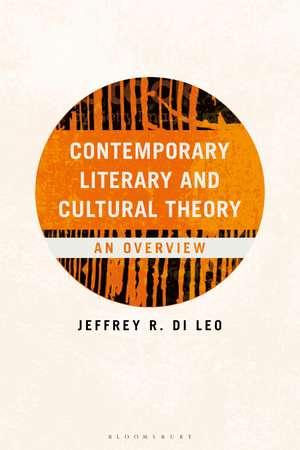Contemporary Literary and Cultural Theory: An Overview
Autor Professor Jeffrey R. Di Leoen Limba Engleză Hardback – 12 iul 2023
Preț: 641.55 lei
Preț vechi: 1119.80 lei
-43% Nou
Puncte Express: 962
Preț estimativ în valută:
122.84€ • 127.91$ • 101.92£
122.84€ • 127.91$ • 101.92£
Carte tipărită la comandă
Livrare economică 14-28 februarie
Preluare comenzi: 021 569.72.76
Specificații
ISBN-13: 9781350366169
ISBN-10: 1350366161
Pagini: 472
Ilustrații: 7 bw illus
Dimensiuni: 189 x 246 x 35 mm
Greutate: 1.18 kg
Editura: Bloomsbury Publishing
Colecția Bloomsbury Academic
Locul publicării:London, United Kingdom
ISBN-10: 1350366161
Pagini: 472
Ilustrații: 7 bw illus
Dimensiuni: 189 x 246 x 35 mm
Greutate: 1.18 kg
Editura: Bloomsbury Publishing
Colecția Bloomsbury Academic
Locul publicării:London, United Kingdom
Caracteristici
The book is extremely wide-ranging and comprehensive in its scope, tackling 75 topics over 15 chapters across both new, cutting-edge topics and more established topics
Notă biografică
Jeffrey R. Di Leo is Professor of English and Philosophy at the University of Houston-Victoria, USA.
Cuprins
Introduction 1 Early Theory 1.0 Introduction 1.1 Humanism 1.2 Rhetoric (or, the Quarrel Between Rhetoric and Philosophy) 1.3 Hermeneutics 1.4 Aestheticism 1.5 New Criticism2 Structuralism and Semiotics 2.0 Introduction 2.1 Structure of the Sign (or, Saussure and Peirce) 2.2 Russian formalism 2.3 Roland Barthes 2.4 Claude Lévi-Strauss 2.5 Narratology3 Marxism 3.0 Introduction 3.1 Karl Marx and Friedrich Engels 3.2 The Adorno-Benjamin Debate 3.3 Mikhail Bakhtin 3.4 Louis Althusser 3.5 Fredric Jameson 4 Psychoanalytic Theory 4.0 Introduction 4.1 Sigmund Freud 4.2 Jacques Lacan 4.3 Harold Bloom 4.4 Félix Guattari and Gilles Deleuze 4.5 Slavoj Zizek 5 Poststructuralism 5.0 Introduction 5.1 Jacques Derrida 5.2 Julia Kristeva 5.3 Jean-François Lyotard 5.4 Jean Baudrillard 5.5 New Historicism 6 Feminist Theory 6.0 Introduction 6.1 First Wave 6.2 Second Wave 6.3 Third Wave and Beyond 6.4 Hélène Cixous 6.5 Luce Irigaray 7 LGBTQ+ Theory 7.0 Introduction 7.1 Lesbian and Gay Theory 7.2 Lesbian Feminism 7.3 Judith Butler 7.4 Eve Kosofsky Sedgwick 7.5 Trans* Theory 8 Race and Justice 8.0 Introduction 8.1 Critical Race Theory 8.2 Law and Literature 8.3 Human Rights 8.4 Intersectionality 8.5 Subaltern Studies 9 Biopolitics 9.0 Introduction 9.1 Michel Foucault 9.2 Giorgio Agamben 9.3 Michael Hart and Antonio Negri 9.4 Surveillance Studies 9.5 Disability Studies 10 Globalization 10.0 Introduction 10.1 Postcolonial Theory 10.2 Border Studies 10.3 Neoliberalism 10.4 Translation 10.5 World Literature and Theory11 Ecocriticism 11.0 Introduction 11.1 Green Theory 11.2 Critical Climate Change 11.3 Anthropocene 11.4 Geocriticism 11.5 Blue Humanities12 Posthumanism 12.0 Introduction 12.1 Cyborg Theory 12.2 Animal Studies 12.3 Systems Theory 12.4 Cognitive Criticism 12.5 Speculative Realism13 Affect Studies 13.0 Introduction 13.1 Queer Affect 13.2 Materialism 13.3 Presentism 13.4 Trauma Theory 13.5 Holocaust Studies 14 Pop Culture 14.0 Introduction 14.1 Cultural Studies 14.2 Media Studies 14.3 Sound Studies 14.4 Game Studies 14.5 Celebrity Studies 15 Against Theory 15.0 Introduction 15.1 Antitheory 15.2 Posttheory 15.3 Object-Oriented Ontology 15.4 Postcritique 15.5 New New Criticism Notes Index
Recenzii
In its scope and ambition, this is a groundbreaking and authoritative reference work that will both define the field and provide an enduring point of orientation. Rich and always accessible, it is an invaluable guide for anyone interested in the study of contemporary literary theory.
Unlike other mechanistic or "how-to" guides, Di Leo's Contemporary Literary and Cultural Theory is an ambitious and rigorous survey of theory from its ancient origins to the present that will be valuable for scholars seeking to understand new directions in (and against) theory as well as students encountering theoretical questions for the first time. Through careful explication and key quotations from primary texts, Di Leo nicely balances the need to provide both an informative-and, at times, reflective-discussion of High Theory, and a precise summary of those areas of theory such as LGBTQ+, Race and Justice, Biopolitics, and Ecocriticism that are most pressing for the field today.
Unlike other mechanistic or "how-to" guides, Di Leo's Contemporary Literary and Cultural Theory is an ambitious and rigorous survey of theory from its ancient origins to the present that will be valuable for scholars seeking to understand new directions in (and against) theory as well as students encountering theoretical questions for the first time. Through careful explication and key quotations from primary texts, Di Leo nicely balances the need to provide both an informative-and, at times, reflective-discussion of High Theory, and a precise summary of those areas of theory such as LGBTQ+, Race and Justice, Biopolitics, and Ecocriticism that are most pressing for the field today.
